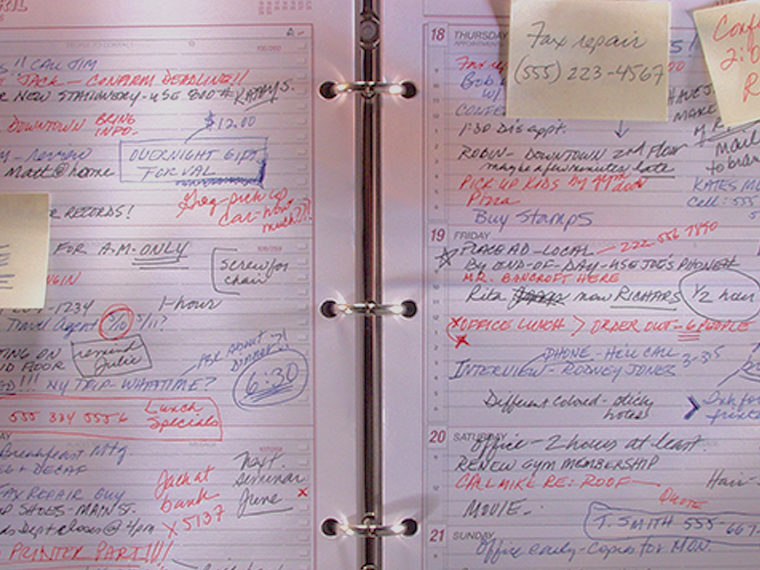A team of researchers weighs contingent planning against traditional time management
Write it down. Schedule everything. Assign blocks of time and color coding, sprinkle with magic dust, then hold your breath and hope there aren’t any interruptions. That’s the downside of traditional time-management planning: It’s only effective when things go … as planned.
Which, in today’s dynamic workplace, is pretty much never. The same variables that make work interesting and satisfying — unexpected challenges, complex responsibilities, a fast pace — also create constant disruptions. Some estimates suggest that employees are interrupted or forced to switch tasks an average of every three minutes. Unplanned breaks take a toll on productivity. They also dampen employees’ enthusiasm for the job.
So, researchers spent two weeks tracking 187 employees from a diverse set of industries. The team: Michael Parke of the London Business School, Justin Weinhardt of the University of Calgary, Andrew Brodsky of the University of Texas at Austin, Subrahmaniam Tangirala of the University of Maryland, College Park, and UCLA Anderson’s Sanford DeVoe.
Opt In to the Review Monthly Email Update.
Their paper, published in the Journal of Applied Psychology, highlights a strategy called contingent planning. Whereas traditional time-management planning overestimates how much will get done and fails to consider disruptions, contingent planning simply assumes things will go wrong.
To identify planning style, employees in the study were asked daily to rate how often they engage in specific behaviors on a scale of 1 (“not at all”) to 7 (“to a very great extent”). Those using traditional time management gave high numbers to (for instance) the statement “I prioritized the tasks I want to accomplish today.” Contingent planners, meanwhile, assigned high numbers to this statement: “I made my plans flexible today to cover any unforeseen events.”
Similar numbering scales were used to measure the number of interruptions in each work day, how engaged and focused employees felt, and how well they thought they met their job responsibilities.
The authors found strong correlations between the type of planning used and employees’ job satisfaction and output. People who used traditional time management were more engaged and productive when they had few interruptions. People who used contingent planning were more engaged and productive no matter whether they were interrupted or not.
One data point: On days where interruptions were high (4.11 or more on that 1–7 scale), traditional time management was completely ineffective at promoting engagement and productivity. How often was that? Nearly 20 percent of the time.
The authors suggest employees prepare for each work day — the night before or the morning of — spending a few minutes considering the day ahead:
- Do you expect interruptions?
- Based on past experience, what kinds of interruptions do you expect?
- How frequently do you expect to be interrupted?
If you expect zero or few interruptions:
- Set a traditional, even ambitious, to-do list that prioritizes tasks.
- Follow the standard recommendation to do difficult or creative tasks when you have the most time or energy, and more mundane items in the gaps between.
- If you do end up with interruptions that day, learn from them and let that inform your subsequent days’ planning.
If you expect frequent interruptions:
- Ask how you can minimize disruption in the first place by creating boundaries around your time. Maybe set specific timeframes within which you’ll check and respond to emails and texts. Send all calls to voicemail. Try an app that limits your time online. What about wearing headphones to deter people from talking to you?
- Set a realistic to-do list that allows time to handle the unexpected. Research shows it can take 10–20 minutes to regain attention after being interrupted. Build in those blocks of time.
- Consider specific types of interruptions and how you might address them. For instance, if a colleague asks for help with something and you’re in the middle of a project, ask if you can get back to them once you’re finished.
Featured Faculty
-
Sanford E. DeVoe
Professor of Management and Organizations, Area Chair
About the Research
Parke, M. R., Weinhardt, J. M., Brodsky, A., Tangirala, S., & DeVoe, S. E. (2018). When daily planning improves employee performance: The importance of planning type, engagement, and interruptions. Journal of Applied Psychology, 103(3), 300–312. doi: 10.1037/apl0000278






